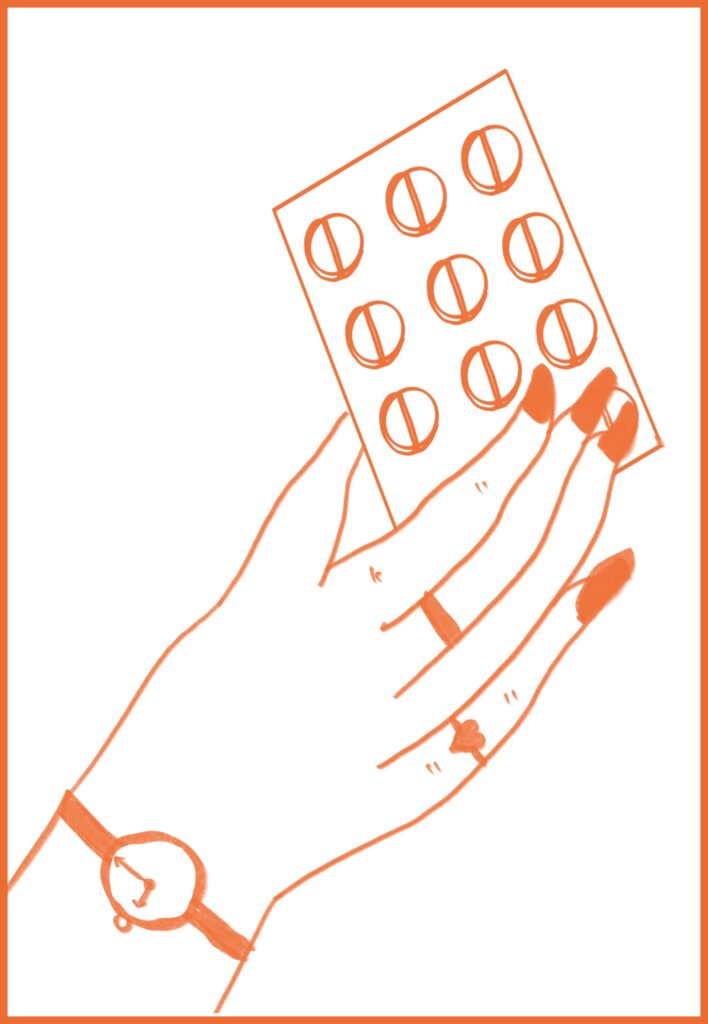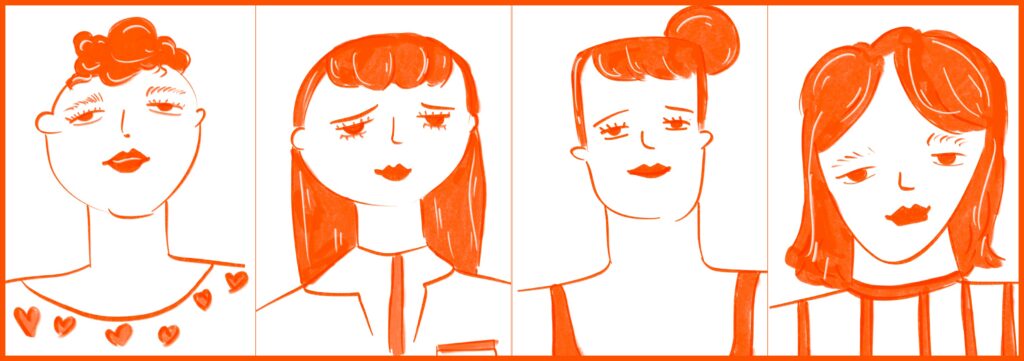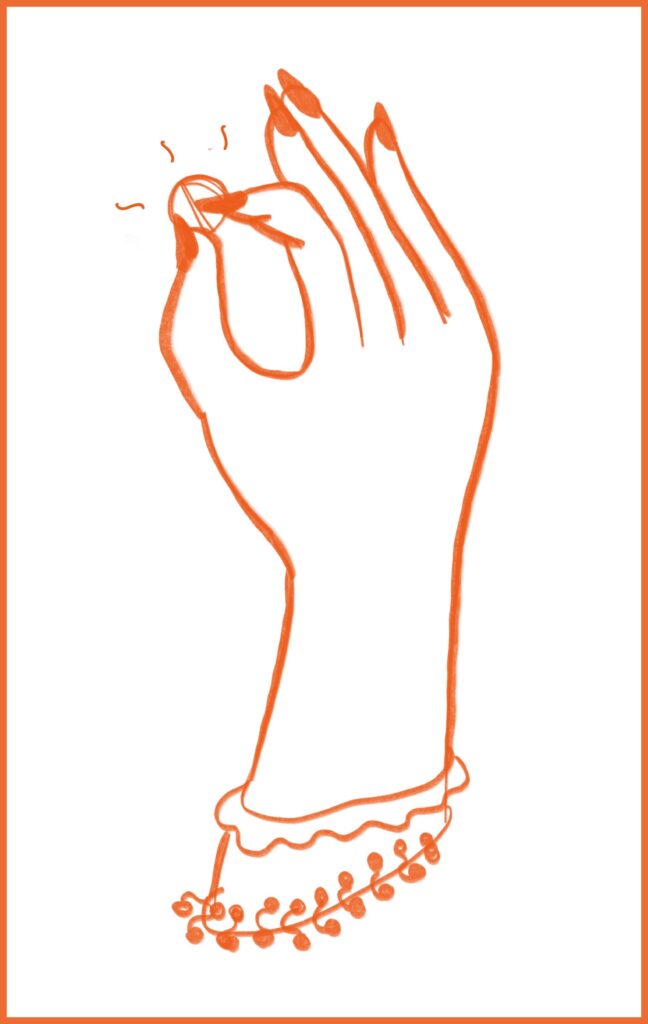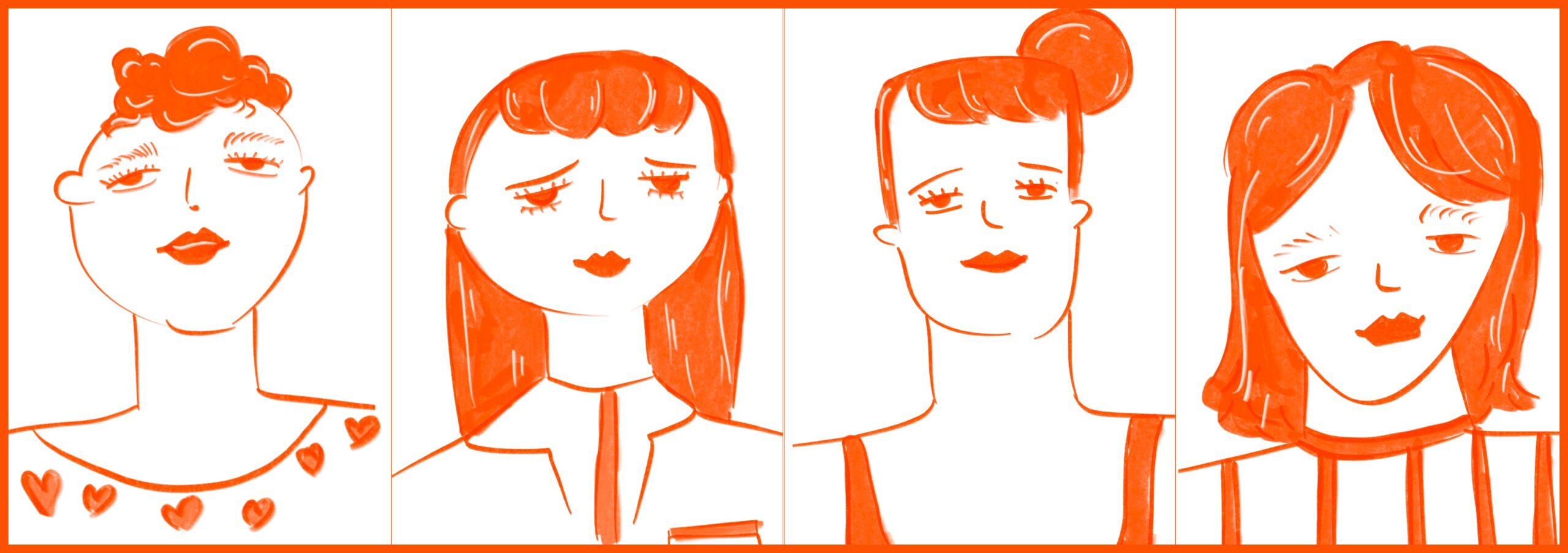Doctors recommend the pill, the IUD, and other contraceptives. Patients are expected to endure their side effects or be left unprotected. That’s what happens in a system largely built by men, for men.
BY KATE JONES
ART BY PRAPTI GOSAIN
———————————————————–
On the first day of her period, Morgan Rivers takes a bath, which relieves her pain—a little. She sits in steaming water, letting it scorch her skin. It hurts, but at least it takes the cramping away. Being too weak to climb out of the tub, she lets every crevice of her skin wrinkle. The built-in tub/shower combo is sandwiched in the corner of the rectangular bathroom. Out of boredom, Rivers looks at the beige tiles that line the shower. Eventually, after almost fainting from the suffocating steam, she negotiates a leg over the edge of the tub. With what little strength she has left, she pulls herself out of the water. Rivers pats herself off (never with a white towel—not a good idea in this state) and crawls back into her bed, which, luckily, is right next to her bathroom, so she doesn’t have to go far. The cramps continue, meaning she’s unable to leave.
As a teen, Rivers, now a 21-year-old Trent University student, never knew when her period would say “Hello” each month. Her cycle was that irregular. But she knew one truth—she would be out of commission on the first day of a fresh cycle. Most people who get periods suffer pain of some kind, but this was different. It was more than cramping. It was pain that left her bedridden, unable to eat, unable to move.
Rivers’ periods began when she was 12 years old. She put up with the pain for three years before seeking her doctor’s advice. According to her family physician, there was only one viable option: birth control. The pill alleviated menstrual cramping well enough, but Rivers claims it also contributed to her weight gain. “My boobs grew, my pant size got bigger. I’m short for my frame. It made me feel like I wasn’t even in my own body anymore, ” says Rivers. “I looked in the mirror at my new body, and it just wasn’t worth staying on it and feeling that way at the time.” She ditched the oral contraception a year later and suffered in silence.
The pill’s formula stems from Aztec tradition. For generations, Mexican women had been eating a type of wild yam, the Barbasco root, as a means of contraception. It wasn’t discovered by scientists until the 1930s, who then used extracted yam progestin to develop birth control. In the early 1950s, the pill was finally created after Margaret Sanger, the founder of the American Birth Control League, drove the research and funding for doctors to start clinical investigation. The first trials were conducted in Puerto Rico, where there were no laws against contraception. The women involved in the trials did not, however, give informed consent and were denied sufficient information about its safety and side effects. Today, many cite it as a classic case of medical racism. In Canada, birth control was made widely available in 1960, but it was initially marketed as “cycle control.” Before it was legalized in 1969, using contraception was not only socially and politically controversial, but illegal.
“The general implication is that, if you take the pill, you ‘may’ develop breast cancer. But don’t worry, there’s just a sliver of a chance that your life could be altered dramatically.”
Essentially, the pill works by stopping ovulation and thickening cervical mucus so sperm cannot fertilize an egg. When taken at the same time every day, it is said to be 91–99 per cent effective. In addition to preventing pregnancy, many people take the pill to reduce menstrual symptoms and hormonal acne, and to prevent endometrial and ovarian cancer. A 2011 study by the Guttmacher Institute revealed that 14 per cent of pill users (around 1.5 million people) take the pill for non-contraceptive reasons such as menstrual pain and regulation, acne, and treatment for endometriosis. Additionally, 58 per cent of pill users are on the pill for both contraceptive and non-contraceptive reasons. It’s easy to see why the pill is such a common option for those who menstruate: it’s a convenient solution for our symptoms that also prevents unwanted pregnancies.

But the palm-sized packet of birth control pills in Canada comes with a foldable piece of paper. It’s a metres-long warning, with rules and side effects in the tiniest font they could get away with. Alesse, one birth control brand, lists side effects such as “tenderness of the breast, nausea, and vomiting,” “weight gain or loss,” and “growth of pre-existing fibroid tumours of the uterus; an increase or decrease in hair growth, sex drive, and appetite; skin pigmentation; headaches; abnormal liver test, severe pain, or lump in the abdomen; rash; and/or vaginal infections.” Along with this long-winded list of infections, tumours, and lumps, the package uses the word “may” 45 times. The general implication is that, if you take the pill, you “may” develop breast cancer. But don’t worry, there’s just a sliver of a chance that your life could be altered dramatically. Oh, and if you’re really lucky, long-term use of the pill could put you at a higher risk of cervical cancer or diabetes. Most doctors skim over these concerns when prescribing the pill, and so do their patients. The lack of knowledge surrounding the pill and its effects can leave people blind to its possible impact on their bodies. Sexual and reproductive health for women and people who menstruate is an under-researched area. Patients have reported a wide range of diverse and contradictory reactions to the pill, and the scientific and medical research that has been done is inconclusive. Despite this, doctors routinely prescribe the pill, sometimes disregarding the potential effects on patients’ brains, mental health, weight gain or loss, and hormonal imbalances. Ultimately, this leaves those who need birth control, or at least who want the option, in the dark about what it could do to their bodies because of a medical system that is often indifferent.
Depressed, Stressed, and Sexually Repressed
When I first went on the birth control pill at 15 years old, I never thought a tiny little white tablet could make me a completely different person. By autumn 2020, I had spent five years taking Alesse, a combination pill prescribed to those who suffer lighter, less painful periods, that contains two “female sex hormones” (levonorgestrel and ethinyl estradiol). Earlier in 2020, at the beginning of the pandemic, I spent hours of each day walking and working out (there was not much else left to do), naturally losing around 30 pounds. I was beginning to feel confident in my new skin, but something was off. I continued to take the pill—it had been my routine for the last five years. But now, my periods were diminishing, my cystic acne was worse than ever, and my mood was so low I could barely manage to go a single day without secretly crying in the shower. Although my new found love for exercise and healthy living released endorphins into my brain like never before, these other symptoms left me frustrated. I linked this behaviour to the pill and brought it to my doctor’s attention. At the time, I was nervous to go off the pill, solely because I’d grown accustomed to it. However, I knew it was time for our break-up. My doctor, on the other hand, suggested a lower dosage rather than an alternate method. I left feeling defeated and unheard. Regardless, in January of 2021, I went ahead and took a break from the tiny pink and white tablets I’d taken for just under 1,900 days.
“My mom started to notice that the confident and energetic facets of my personality had faded. It was like talking to the colour grey. Boring.”
My timing wasn’t perfect. We were almost a full year into the pandemic. Ontario was in the midst of a lockdown and most of my time was spent inside, hiding from the infectious environment. I sat there, huddled underneath my duvet, drenching the beige, linen cover with salty tears and whimpering quietly. I didn’t want my family to see me cry. It was embarrassing. This went on for three weeks until I realized something: this time period coincided exactly with my decision to stop taking the pill. The pill couldn’t make me feel the fiery depths of hell as revenge for abandoning it—could it?
Eventually, my mom started to notice that the confident and energetic—bordering on hyper—facets of my personality had faded. It was like talking to the colour grey. Boring. She came into my room, sat on my bed, and asked me what was wrong. Out came the water works. A minute later, when I was finally able to speak through my tears, I told my mom that I thought I was depressed. Along with being nurturing and maternal, my mom is a health freak, commonly referred to as a “granola mom.” The only “treats” you would ever be able to find in my house were dark chocolate chips, and not even the good kind, the kind you bake with. When she entered menopause, she did her own naturopathic research on hormone fluctuations, wanting to approach the change in the most holistic way. For her, this meant without synthetic hormones. She introduced the idea that the decline in my mental health was possibly linked to cutting ties with the pill.
There is limited research about the pill’s side effects, and the studies that do exist have findings that are wildly mixed. A 2015 Danish study reported finding links between oral contraception and an increased risk of depression, while a 2017 Swedish study found no association between the two. Additionally, a 2012 American study showed that oral contraception reduces levels of depression. Essentially, you might get depression, you might not, or if you already suffer from it, the pill might help. What an exciting guessing game for the brain! These conflicting findings leave people even more confused about the pill’s effects. Because of this, they are obligated to rely on their own research and gut feelings to determine what is best for their health, rather than having access to trained medical professionals who can conclusively answer their questions.
Generations on the Pill
Oral contraception has become a popular choice for those looking to prevent pregnancy, reduce and regulate menstrual pain, and treat issues such as endometriosis. I don’t blame women and the other people who use it for bowing to the convenience—it’s an easy pill to swallow. But its popularity has left us confused as to what the pill can potentially do to our bodies, and the stakes are high. In general, women are twice as likely as men to be diagnosed with depression. These levels of depression in women could be caused by the two sex hormones that are also found in oral contraceptives. This anecdotal evidence about a potential connection between contraceptives and levels of depression in women is pushing researchers to dive into studying reproductive and sexual health further, says Laura Gravelsins, a PhD student at the University of Toronto. Gravelsins studies the influence of ovarian hormone deprivation on brain health. “We need to listen to women who have been on contraception,” she says.

Despite the mixed results of the studies, one common trend seems to be appearing: teens are most affected by the pill. However, about 2.5 million teens in America between the ages of 13 and 18 take the oral contraceptive. Rivers and I were both prescribed the pill at 15. We knew little about it, except that the next day, we could go back to school and brag that we were on birth control. All our friends set up alarms to go off at a certain time each day bearing a reminder, something along the lines of “take your BC.” When it went off in front of boys, it was both embarrassing and addictive. Being on the pill as a teenager was almost like a reminder of our entrance into womanhood. Even though many of us were on it for reasons besides pregnancy prevention, like regulating our periods or treating our pubescent acne, it still held a certain status. It let everyone know our bodies were developing. Now, we could be viewed as adults.
A Danish study was conducted 2000–2013 to examine the link between the pill and depression among women. It looked at women across the country, ages 15–34, who were taking the pill, had not previously suffered from mental illness or any forms of cancer, and had not received any infertility treatment. In total, the study looked at over 1 million women over the course of 14 years. Through a short-term cycle of being on the pill, the study revealed that women were 50 per cent more likely to be diagnosed with depression after six months. The pill also had a more significant effect on girls and young women, ages 15–19, whose brains were still developing. But results from other studies clash with these findings. A Nordic study found that there was no distinguishing link between oral contraceptives and depression among their subjects.
“Women’s health is under-researched, and this has repercussions for more than just sexual and reproductive health.”
Jesse Lacasse, a PhD candidate in behavioural neuroscience at Concordia University, thinks that even though the pill can cause side effects like depression and weight gain, which deter many possible takers, it is a way to regulate young people’s periods. Young people experience irregular cycles more often, and it can help stabilize their hormones. The issue is not that the pill causes adverse effects in every person who takes it, the problem lies with the lack of research about the bodies of the women, nonbinary people, and trans people. “We have such a lack of understanding about the fluctuations,” says Lacasse, “and what might be driving these big changes in hormones, especially in puberty, and in young women.”
Studies have also shown that the long-term use of oral contraceptives can benefit the brain as it enters menopause. During this phase, people tend to see their estrogen production decline rapidly, or stop altogether. Estrogen acts as a “protective molecule for the brain,” says Lacasse. He studies the influence of hormonal contraceptives on the female brain’s behaviour by looking closely at rats. He says although there are studies displaying a link between oral contraceptives and depression, research around birth control is “really mixed.” But, researchers are beginning to find positive associations between the pill and female brain health. Lacasse, whose mother started taking the pill to regulate her menstrual symptoms, says it can be used as a preventive measure against Alzheimer’s and cognitive decline. “Maybe that’s related to the high amounts of estrogen in these pills.”
For one generation, the pill can cause body altering symptoms such as depression, weight gain, and much more. But for another, the pill is being used to support brain health. A 2012 study looked at 261 women, aged 40–65, in the Wisconsin Registry for Alzheimer’s Prevention database. It found that the use of hormonal contraceptives may protect the brain from memory-affected diseases like Alzheimer’s, even if subjects had been off the pill for years. However, they’re seeing greater results with women who have used the pill over a longer period of time.
Women’s health is under-researched, despite women making up over 50 per cent of the world’s population, and this has repercussions for more than just sexual and reproductive health. The number-one killer for women in the U.S. is cardiovascular disease, yet only about a third of participants in clinical trials for treatments are female. This research, or lack thereof, isn’t enough to give women the answers they need about their bodies. And they’re not the only ones who are neglected. A 2017 study found that the biggest barrier to health care reported by trans individuals is the fact that doctors are insufficiently trained to answer their questions or provide suitable treatments.
Because the medical system habitually disregards people who menstruate, apparently seeing them as less deserving of attention than cisgender men, the little studies we do have are a messy pile of contradictory information. That’s what makes the pill so tricky. There’s evidence that shows it has real benefits, but other evidence that proves the opposite. Beyond that, if things do go wrong, there’s a decent chance no one will know the exact cause, or how to fix it. Thanks to the neglect of the medical system, people who go on the pill—or any form of birth control—are often left in the dark.
A Privileged View
Some readers may now be thinking: if the pill is affecting your body so much, why don’t you just come off it? It’s not always that simple. If I choose not to be on birth control, I’d have a higher chance of getting pregnant. I’m a 21-year-old student and I still live with my parents. I have goals in my professional career, student loans to pay, and don’t even know if I want children. So, sex would no longer be pleasurable. Instead, it would be filled with raging anxiety which would rear its head again every time my natural cycle was a day or two late. But according to the often male-dominated medical system, I’m the problem.
Lacasse went into his PhD research skeptical of the pill, specifically because it is man-made and not natural. But the research data encouraged him to reassess this opinion. Like Lacasse, I was conflicted about the pill. I started writing this story believing the pill wasn’t good for people in general. Because of my own experience—where my lack of knowledge about the pill ended in completely changing my body and relationship with myself—I believed I had been set up for failure. Through months of researching and speaking with medical professionals, friends, and other people on the pill, I learned that my experiences are my own. My frustration never actually stemmed from the pill itself. Instead, the root cause was my lack of knowledge surrounding birth control, and the disregard people like me experience when their negative symptoms are brushed off by medical professionals. I felt like my body wasn’t being taken seriously by a team of people whose job was to do so.
“For many, going on the pill is not a choice, but the only available source of protection and control.”
Advancements such as the legalization of abortion in Canada, the creation of Plan B, and the legalization of the birth control pill in 1969, slowly improved the relationship between people who menstruate and their sexual health. It introduced conversations about menstruation and sex, and allowed people to make their own decisions about the protection they want for their bodies. While the legacy of these changes is complex and remains unresolved, Lacasse says it’s important not to make sweeping negative statements about where things stand today because, ultimately, they have had truly positive effects on people’s lives. Lacasse also says the pill can be a solution for people who suffer extremely painful periods or PCOS (polycystic ovary syndrome), giving them more control over their body. Gillian Einstein, a faculty member in the psychology department at the University of Toronto and adjunct scientist at the Women’s College Research Institute, thinks the pill can be seen as a “political statement.” She says, “We need to be fighting for our rights all the time. Women need to be very cognizant that our rights to controlling our own bodies are diminishing around the world. Luckily, in Canada, they’re still strong.”

In 2022, abortion became illegal in over 10 states in America. Now, in some areas of the United States, women, non-binary people, and trans men, as well as those who help them, are being criminalized for controlling their own bodies. Reproductive rights advocates worry insurance coverage for the pill could be the next to go. “This is why,” says Einstein, “we can’t take the pill for granted.”
However, for many, going on the pill is not a choice, but the only available source of protection and control. After three more years of pain and uncomfortable gynecology appointments, Rivers finally found out what was wrong with her abnormal period. She has an inverted uterus, meaning it points backward towards her spine, rather than toward her belly button, and it can increase her risk for endometriosis and possibly infertility later in life. As someone who’s dreamed of being a mom, Rivers was not about to accept this. Her doctor put her back on a low-dose birth control, saying it was the only option for reducing her risk of infertility down the road (an IUD wasn’t a possibility because of her inverted uterus). Her prior unwanted symptoms, like weight gain, were disregarded, and her doctor gave her no other alternative. “It’s a scary feeling to be told that down the road I could get endometriosis, making it harder for me to become pregnant,” says Rivers. “I would do anything if it meant increasing my chances to have kids later. If it means temporarily being on the pill again, then that’s what I have to do.”
Einstein believes that many people on the pill are weighing the risks and benefits. Her research focuses on women’s brain health and aging. Although there are few studies that explore the benefits and the risks, Einstein says, “the long-term effects of oral contraceptives just haven’t been studied well, and the studies that do exist are mixing all kinds of oral contraceptives.” All birth control pills aren’t the same. Some have higher doses of estrogen and others have higher doses of progesterone. “Once you start mixing them like that, it’s hard to separate out and say, ‘Okay, this one has no effects, and this can have serious side effects.’” Despite the pill being an advancement and a hard-won privilege, women and many others are still making important health decisions without knowing enough about the effects or consequences. The fight for these advancements is far from over.
The Alternative
I meet my old roommate, Madison Convey, at Dineen, a coffee shop on a busy corner south of Dundas Square in Toronto. Typically, the regulars are businessmen and women dressed in suits, getting their caffeine fix for a hectic day in the office. We feel out of place as university students on the cusp of winter break, meeting up to gossip rather than work. I arrive around 9:30 a.m., grab my vanilla latte with almond milk, and take a seat near the front door at a high-top marble table. Convey had texted me earlier to tell me she was going to be 15 minutes late, as she needed to get her blood taken around 8 a.m. I didn’t know what for, but I didn’t ask questions. I knew she would tell me in person—she always has the wildest experiences. Hearing a story from Convey was like turning on the news and seeing that Brad Pitt and Angelina Jolie just broke up. You never see it coming, it’s sure to leave you in shock, and you’re bound to have loads of follow-up questions.
Convey arrives 15 minutes later with Eric, her boyfriend. They live together and have been dating for three years. He had offered to accompany Convey to her appointment for moral support. She rushes to me with a huge smile. After grabbing her iced coffee with oat milk, she sits across from me, while Eric sits beside me sipping from his grey stainless steel water bottle.
“You will never believe my morning,” says Convey. She’d been having trouble with her IUD, which she had inserted almost three years ago during our first year of university. IUD stands for intrauterine device, and is a contraceptive designed to fit into your uterus and block semen from fertilizing an egg. When Convey first had her IUD inserted, the pain was so intense that she passed out in the middle of the procedure. For months, she continued to bleed, and I would often come into her dorm room and comfort her during the cramping pains.
“Alongside a lack of birth control options, the real problem is how people seeking contraception are treated in the health care system.”
Now, in our final year of university, Convey says her IUD has been so painful that she can’t even put a tampon in anymore. Looking for answers, she phoned her doctor’s office back in Barrie in December 2022, only to be told that they couldn’t see her until April 2023. The pain was too much for her to wait that long, and she was itching to find out what was happening. She went to her campus doctor at Toronto Metropolitan University, who then sent her to St. Michael’s Hospital Life Labs to get her blood taken. Then she came to me.
About an hour into our conversation, we’re interrupted by a phone call from the hospital. Convey answers it while Eric and I go silent. Her face reads panic, but she’s trying to keep it together. I could tell she wanted to cry—I make that same face myself. It’s the one where your brain is trying to signal to your face to calm down, and forces an anxious smile while you massage your upper eyebrow and avoid all eye contact. She interrupts the woman on the phone, telling her she’s busy and can’t answer all of her questions. She hangs up. “My IUD was inserted wrong and now it’s stuck in my uterus and has to be surgically removed.” Eric and I try to comfort her, telling her it will be okay and it’s a good thing she’s getting her problem dealt with. But Convey isn’t ready to talk about it. Rather than waiting for a surgical procedure, Convey has to have her IUD removed by her family doctor because her pain is so severe.
If it wasn’t for her urge to find out what was wrong with her, Convey would have waited months to hear this urgent news because multiple doctors had brushed off her symptoms. Along with the pill, the IUD has become a reliable choice for women looking to go on birth control. However, complications can occur. The pain of insertion—for which you are fully awake—has been compared to birthing contractions, but worse. I used to think the pill was the problem. Now I’ve realized that, alongside a lack of birth control options, the real problem is how people seeking contraception are treated in the health care system. They’re neglected, their symptoms are pushed aside, and their issues are not seen as real. Convey’s and Rivers’ experiences are not isolated, and they don’t come close to representing the scope of the problem.
Gravelsins summarizes the health care system’s attitude toward reproductive health in this way: “This is the only option you have. It sucks that you’re having side effects, but just try your best to make it work. It’s you that needs to change, rather than something societal or medical.” In other words, you are the problem.
While men get 92 per cent of the research funding, we are told we are “acting out” because it’s our “time of the month.” The consequences can be severe. For those in Convey’s situation, for instance, it could mean having their gynecologist insert an IUD incorrectly. And who or what will be at fault? Not the doctor, nor the lack of research surrounding hormonal contraceptives. No, as always, it will be our bodies that bear the brunt of the blame.

